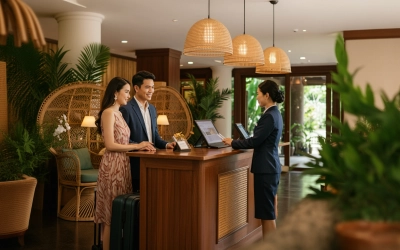Face à une tendance mondiale vers une diminution des interactions physiques, les hôteliers tentent de procéder aux ajustements nécessaires pour fonctionner dans une nouvelle normalité. La possibilité d'enregistrer les clients sans aucun contact physique est devenue une priorité cruciale. Alors que les hôteliers s'empressent de répondre à ce besoin, des expressions telles que « enregistrement mobile », « enregistrement à distance » et « enregistrement sans contact » sont devenues des mots à la mode, semant la confusion quant aux besoins des hôteliers et aux services disponibles.
Nous avons pensé qu'il serait utile de le décomposer. Qu'est-ce que l'enregistrement sans contact exactement ? De quoi ai-je besoin dans mon établissement ? Quel matériel, quelles intégrations et quelles nouvelles procédures opérationnelles sont nécessaires ? Jetons un coup d'œil.
Pour commencer, sachez que enregistrement sans contact, l'enregistrement à distance et l'enregistrement mobile font tous référence au même processus. C'est l'idée de permettre à un client de s'enregistrer sur son téléphone portable sans aucun contact matériel ou physique avec les membres de votre équipe. À l'avenir, je l'appellerai « enregistrement sans contact ».
Afin de comprendre l'enregistrement sans contact, nous devons commencer par passer en revue les étapes du processus d'enregistrement actuel aujourd'hui :
-
The guest arrives on property.
-
The front-desk agent requests the guest to provide information. This normally includes:
– A government issued photo identification
– A form of payment (most often credit or debit card).
-
The front-desk agent then retrieves the reservation in the Property Management System (PMS) and conducts a check-in by assigning a room, authorizing the credit card, and performing a visual inspection of the ID to verify the guest’s identity.
-
The agent then asks the guest to sign a registration card to confirm guest information.
-
Lastly, the hotel provides a roomkey and information about the hotel.
Maintenant que nous avons examiné le processus d'enregistrement actuel, nous pouvons déterminer ce qui est nécessaire pour effectuer le processus d'enregistrement sans contact. Du point de vue technologique, il y a trois éléments :
A. Collecte des informations sur les clients et accusé de réception (étapes 1, 2 et 4 ci-dessus)
Il est essentiel de recueillir à distance les informations de l'invité en toute sécurité et de les associer au PMS. La meilleure approche pour collecter en toute sécurité les informations des clients sans aucun échange physique consiste à utiliser l'appareil mobile du client, au lieu d'un appareil fourni par l'hôtel qui sera utilisé plusieurs fois.
La collecte d'informations sur le téléphone portable d'un client peut être effectuée de deux manières différentes : via le Web ou via une application. La plupart des clients préfèrent le Web mobile car il ne les oblige pas à télécharger une nouvelle application.
Un autre élément à prendre en compte est de s'assurer que les informations sont collectées de manière sécurisée et de s'assurer que vous collectez toutes les informations nécessaires (pièce d'identité, carte de crédit et formulaire d'inscription). Les informations de paiement, en particulier, doivent être collectées dans un environnement sécurisé et conforme à la norme PCI.
Enfin, il sera essentiel de récupérer l'autographe du client pour obtenir un accusé de réception (formulaire d'enregistrement) pour protéger la propriété.
B. Attribution d'une chambre (Étape 3 ci-dessus)
Ceci est géré par le PMS et n'implique aucun contact physique. Il est recommandé de s'assurer que la solution que vous utilisez pour collecter les données des clients est correctement intégrée à votre PMS afin de ne pas avoir à le faire manuellement.
C. Création d'une clé mobile (étape 5 ci-dessus)
Idéalement, au lieu de coder une carte physique, la clé serait livrée sur l'appareil mobile du client. Cela nécessite l'installation de matériel sur chaque porte et un fournisseur de clés pour gérer la connexion à chaque serrure. Afin de garantir la meilleure expérience à vos clients, vous devez également vous assurer que le système de clés mobiles et le système sécurisé de collecte d'informations sur les clients sont liés et compatibles.
Heureusement, les hôteliers n'ont pas besoin de tout aborder en même temps. De nombreux hôtels n'ont pas le budget à dépenser dans le contexte actuel et adoptent une approche progressive en matière d'enregistrement sans contact. Envisagez de commencer par une nouvelle méthode sans contact pour collecter les informations sur les clients, puis d'introduire progressivement la clé mobile une fois que vous serez en mesure de mettre à niveau le matériel.
Les hôteliers optent pour ce que l'on appelait communément « l'enregistrement mobile » depuis près de dix ans. Maintenant que la pandémie de coronavirus nous a obligés à envisager les transactions physiques d'une nouvelle manière, il est temps d'accélérer l'adoption. Pour en savoir plus sur le passage à un environnement d'enregistrement sans contact, contactez-nous ici.










.webp)





